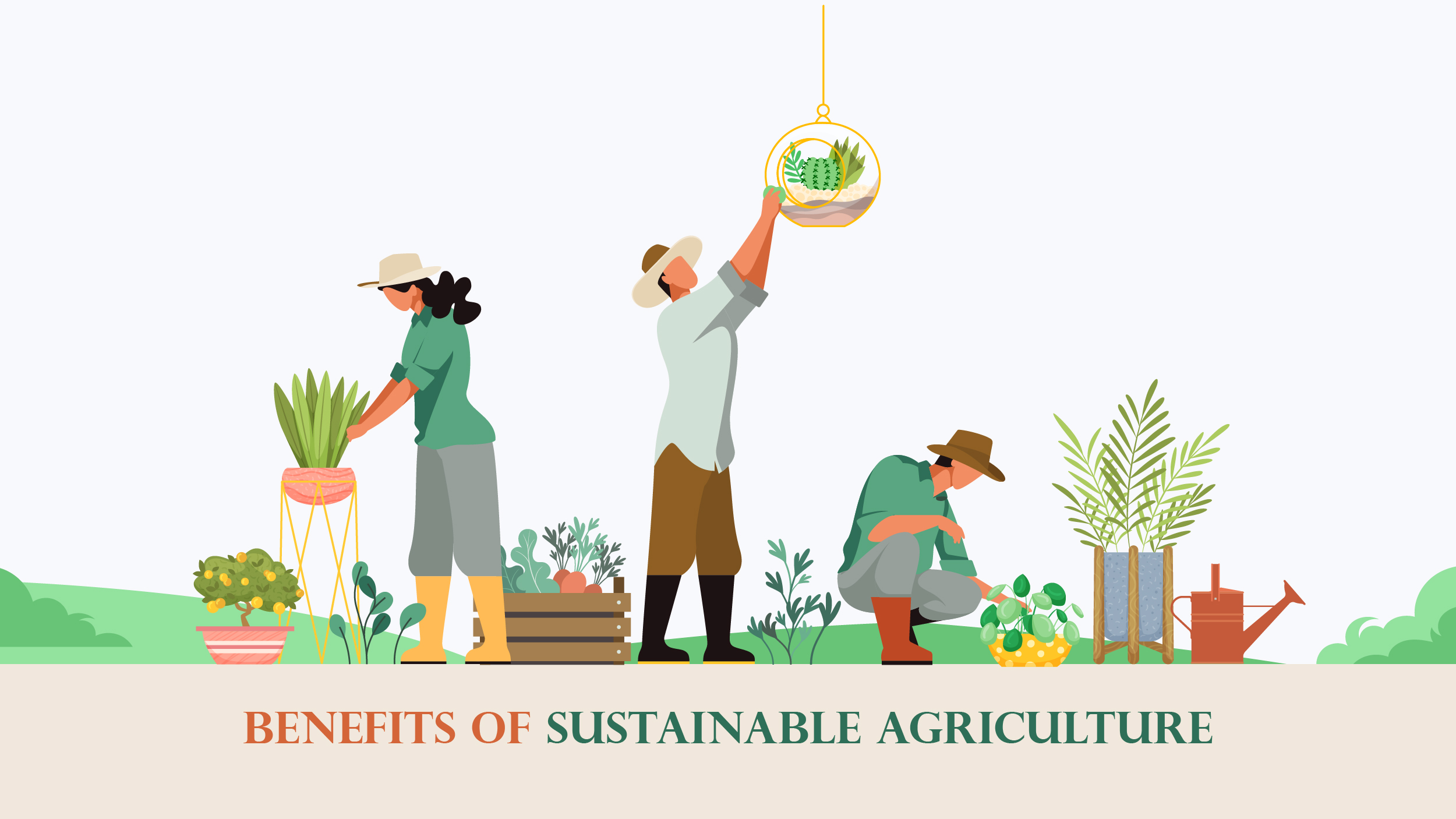Modern agricultural practices have undoubtedly brought about significant advancements in food production. However, they have also led to several challenges, including environmental degradation, soil erosion, and the excessive use of chemical fertilizers and pesticides. As we continue to witness the negative impact of conventional agriculture on our planet, the need for more sustainable farming methods becomes increasingly apparent. This blog will explore the concept of sustainable agriculture and how it can address the problems associated with current agricultural practices.
What is Sustainable Agriculture?
Sustainable agriculture (sustainable farming) refers to an approach that aims to meet the needs of the present generation without compromising the ability of future generations to meet their own needs. It encompasses practices that prioritize environmental stewardship, economic viability, and social equity. By adopting sustainable farming methods, we can create a harmonious relationship between agriculture and the environment.
What Type of Agriculture is Most Sustainable?
Several farming techniques fall under the umbrella of sustainable agriculture. One such technique is organic farming, which eliminates the use of synthetic fertilizers and pesticides and promotes the use of natural alternatives. By relying on natural processes, organic farming minimizes the negative impact on the environment and helps to maintain soil health.
Another approach to sustainable farming is agroforestry, which combines the cultivation of trees with crops. This system not only helps in conserving soil and water but also provides additional benefits such as shade, windbreaks, and biodiversity enhancement.
Permaculture is another innovative farming practice that mimics natural ecosystems. It focuses on creating self-sustaining agricultural systems by maximizing resource utilization and minimizing waste. Permaculture encourages the integration of plants, animals, and microorganisms to create a resilient and productive ecosystem.
Also Read : A Beginner’s Guide to Implementing IoT Data Analytics in Your Organization
Benefits of Sustainable Agriculture

- Environmental Conservation: It minimizes the use of synthetic inputs, such as chemical fertilizers and pesticides, reducing the risk of water and soil contamination. By promoting biodiversity and soil conservation practices, sustainable farming methods help maintain ecosystem balance and protect natural resources.
- Enhanced Soil Health: This type of agriculture prioritizes soil health through practices like crop rotation, cover cropping, and composting. These techniques enrich the soil with organic matter, improve fertility, and reduce erosion, ensuring long-term productivity and resilience.
- Economic Viability: Sustainable farming can provide economic benefits to farmers. By diversifying crops and adopting innovative techniques, farmers can reduce input costs, increase yields, and access niche markets that value sustainable produce. This creates opportunities for increased profitability and long-term economic stability.
- Social Equity: Sustainable farming promotes fair labor practices, ensuring that farmers and workers receive fair wages and safe working conditions. It also encourages community engagement and local food systems, fostering stronger connections between farmers and consumers.
Challenges Faced by Sustainable Farming

Sustainable farming, while presenting solutions to numerous issues linked with current agricultural methods, confronts its array of challenges. Here are some of the primary challenges:
- Feeding a Growing Population: With the world’s population expected to surpass 9.2 billion by 2050, there’s a pressing need to significantly boost food production. Sustainable agriculture must innovate ways to meet this escalating demand while minimizing environmental harm and ensuring enduring food security.
- Limited Arable Land: The per capita availability of arable land is dwindling, underscoring the importance of maximizing land productivity. Sustainable agriculture practices should prioritize increasing yields per hectare through the efficient utilization of resources like targeted fertilizers and plant protection methods.
- Loss of Usable Land: Land degradation and urban expansion contribute to the loss of viable agricultural land. Sustainable farming must counter this challenge by implementing practices that prevent soil erosion, foster soil health, and safeguard land from degradation.
- Resource Scarcity: Sustainable agriculture needs to address the scarcity of vital resources such as water and energy. Water scarcity, in particular, poses a significant hurdle, as many agricultural regions grapple with water shortages due to climate fluctuations and excessive water usage. Sustainable practices should emphasize efficient water management and conservation techniques.
- Climate Change: Agriculture is susceptible to the impacts of climate change, including extreme weather events, shifting precipitation patterns, and rising temperatures. Sustainable farming must adapt to these changes and cultivate resilient farming systems capable of withstanding and mitigating the effects of climate change.
Decoding Nanomaterials Impact Factors and Examples
In recent years, nanotechnology has emerged as a potential game-changer in sustainable agriculture. Nanomaterials, with their unique properties and functionalities, offer various benefits in terms of crop productivity, resource utilization, and environmental sustainability. Some examples of nanomaterials used in agriculture include nanofertilizers, nanopesticides, and nanosensors.
Nanofertilizers are designed to improve nutrient availability and uptake by plants, leading to enhanced crop yield and reduced environmental impact. Nanopesticides, on the other hand, have the potential to target pests more effectively, reducing the need for excessive pesticide use. Nanosensors can play a crucial role in monitoring soil health, water quality, and crop diseases, allowing farmers to make informed decisions and optimize resource usage.
The Bottom Line
Sustainable agriculture offers a promising solution to the challenges posed by conventional farming practices. By adopting sustainable methods, such as organic farming, agroforestry, and permaculture, we can ensure the long-term viability of our food systems while minimizing environmental harm. Additionally, the integration of nanomaterials in agriculture holds the potential to further enhance sustainability and efficiency. Embracing sustainable agriculture is not just an environmental necessity but also a pathway towards a greener and more prosperous future.




